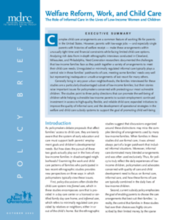EXECUTIVE SUMMARY
Complex child care arrangements are a common feature of working life for parents in the United States. However, parents with low-wage jobs — and especially single parents with histories of welfare receipt — make these arrangements within unusually tight time and financial constraints while facing limited child care options. Analyzing rich data from in-depth ethnographic interviews conducted in Cleveland, Milwaukee, and Philadelphia, Next Generation researchers documented the challenges that low-income families face as they patch together a variety of arrangements to meet their child care needs. Unregulated or minimally regulated informal care typically plays a central role in these families’ patchworks of care, meeting some families’ needs very well but representing inadequate or unsafe arrangements of last resort for many others.
Generally living in very poor urban neighborhoods, the families interviewed for these studies are a particularly disadvantaged subset of low-income families; but their stories raise important issues for policymakers concerned with protecting our most vulnerable children. The studies point to three policy directions that can promote the well-being of children while helping vulnerable low-income parents to sustain employment: continued investment in access to high-quality, flexible, and reliable child care; expanded initiatives to improve the quality of informal care; and the development of operational strategies in the welfare and child care subsidy systems to support the goal of promoting child well-being.

